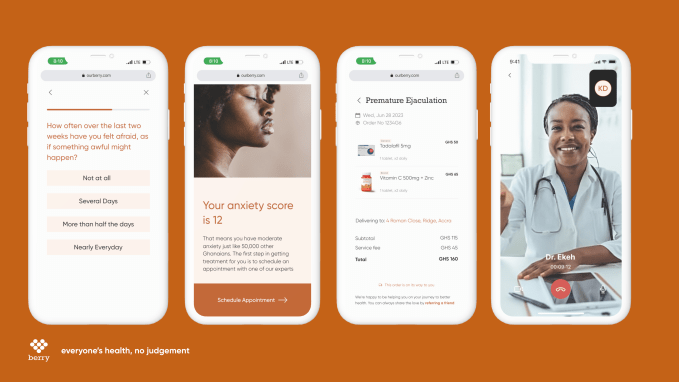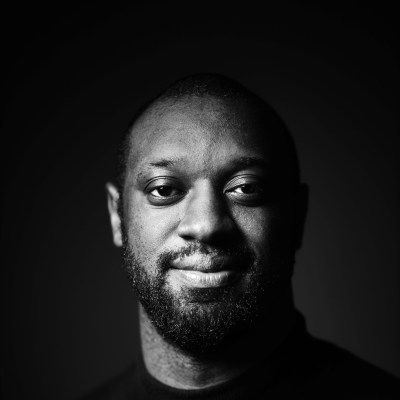Sexual and mental health stigmatization in Africa has evolved over several decades to a point where negligence to address the issue has led to the continent topping the charts in sexually transmitted infections (STIs) and mental health cases.
For one, around 11 people per 100,000 die by suicide in Africa yearly, according to the World Health Organization; that’s compared to the global average of nine per 100,000 people. In addition, the sub-Saharan region is second only to Southeast Asia in the highest incidence of STIs, with over 80 million cases annually.
There’s no one-size-fits-all approach to tackling the stigma around sexual and mental health in Africa considering sporadic governmental efforts. To this end, Berry Health, a several- months-old Ghanaian startup, is throwing its hat into the ring, like many other startups, off the back of a $1.6 million pre-seed round co-led by U.S.-based large-size funds Lightspeed Venture Partners (its first investment in Africa) and General Catalyst.
In an interview with TechCrunch, Berry Health founder and CEO Fredua Akosa said the health tech startup is “bringing judgment-free health care in a 21st-century way in a continent where stigma cuts deeper and is affecting so many lives.”
Akosa has had quite the career. After moving from London, where he grew up, to Ghana, where he completed medical school, the chief executive practiced as a general practitioner for five years in hospitals around rural and urban areas. But at Yale, where he was advancing his studies in public health as a researcher, and later at Oxford during his MBA, Akosa said he discovered tech’s place in healthcare to “impact lives at scale.”
“During the pandemic, I’d come over to Ghana to visit family and of course, I had a lot of patients, including family members and friends, asking for free consultations. During that period, I realized a massive explosion in mental health conditions and conditions around stigmatized health care,” said the British-Ghanaian medical doctor. “People felt so embarrassed going to the hospital and talking about things they felt ashamed of when they shouldn’t have. That was the genesis for me for Berry: just realizing that there is a huge need to break stigma in health through technology.”
If Africa having the highest rates of suicide, clinically diagnosed depression and sexually transmitted infections globally paints a stark picture of the continent, the continent’s low ratio of doctors to individuals (1:10,000) paints a starker picture (in contrast to 30 doctors per 10,000 people in the U.S. and 37 doctors per 10,000 in Europe). The good news, however, is that with help from pandemic-changing behaviors, this situation has accelerated the use of telemedicine, virtual care and drug-delivery platforms in Africa, fueling investor interest in Africa’s health tech in recent years; Yodawy, Reliance Health, Healthtracka, Helium Health, Esaal and MyHealth Africa are a few beneficiaries across the continent.
The models employed by these startups have democratized access to healthcare services traditionally limited to in-person, often expensive consultations. They also enable a broader range of consumers to control their health and wellness, eliminating barriers that have hindered access to quality care. As such, Berry Health, starting with customers from Ghana, offers remote diagnosis — for conditions such as anxiety, depression and sexual health (e.g., birth control and erectile dysfunction), dermatology and hair loss — through telemedicine and treatment via online consultations and home delivery services. On the platform, customers can talk to a licensed medical doctor or clinical psychologist, have a curated personal treatment plan for their conditions, and then get medications delivered.
“These are some areas we’re focused on: mental health, dermatology, hair loss and sexual health conditions that generally people feel too embarrassed to go to the hospital. We’re super excited about the number of other players in healthcare because we know how complex the general healthcare problem is, me being a practitioner,” said the CEO. “But our focus is stigma and we want to make people comfortable in seeking care, not feel judged or as if they’re wrong for seeking treatment.”
The subscription-based platform plans to charge 299GH ($26) yearly for users to access all its services and $5 per consultation with clinicians (Akosa said this fee is 25% less than what is typically charged in Ghana for instance). Berry Health — whose executive team includes professionals from WPP, Instacart and Babylon Health and a medical advisory board comprising gynecologists, dermatologists and several other specialists — has signed several doctors and clinicians and intends to emerge out of stealth at the end of next month, according to Akosa.

Image Credits: Berry Health
Most of Berry Health’s executive team have worked for several years in the U.S. and Europe, raising some concern that their expertise might not be suitable for the African health tech market, which has peculiar challenges. Akosa, addressing this, opines that it was paramount for the Accra- and London-based health upstart to put together a team from “diverse regions, views, and perspectives (including himself and several clinical psychologists on the ground) to tackle Africa’s healthcare problems.”
“It’s more difficult for many companies in Europe and the U.S. to achieve the kind of healthcare revolution that Fredua is trying to achieve in Africa because, in addition to their medical systems being complicated and expensive, there are many regulations, rules and restrictions. But there’s an opportunity to do more with Africa with a team like this,” said Paul Murphy, partner at Lightspeed, on a call with TechCrunch, when asked about Berry Health’s team structure.
After concluding his MBA at Oxford, Akosa moved into venture capital as an associate at Northzone, where he worked with Murphy, including in a Series A investment into New York–based healthcare services, Thirty Madison. The doctor-cum-investor-cum-founder went on to work at growth for one of Europe’s fastest-growing startups: $10 billion quick-commerce upstart Flink.
“He’s got a CV that you could only dream of, plus we’ve got this underserved market, a business model that we know works well in the U.S. and Europe. These are all the ingredients for what could be a phenomenal business that helps people. That’s why we got so excited about it so quickly,” added Murphy, on why Lightspeed, which has successfully backed several healthcare businesses in various markets such as Aledade, Wheel and Air Doctor, made its first investment in Africa via Berry Health.
Other investors in the health tech’s pre-seed round include Reddit COO Jen Wong; Thirty Madison co-founders Demetri Karagas and Steven Gutentag; New York tech lawyer and VC Ed and Betsy Zimmerman; and former U.S. Surgeon General under the Obama administration Regina Benjamin.
